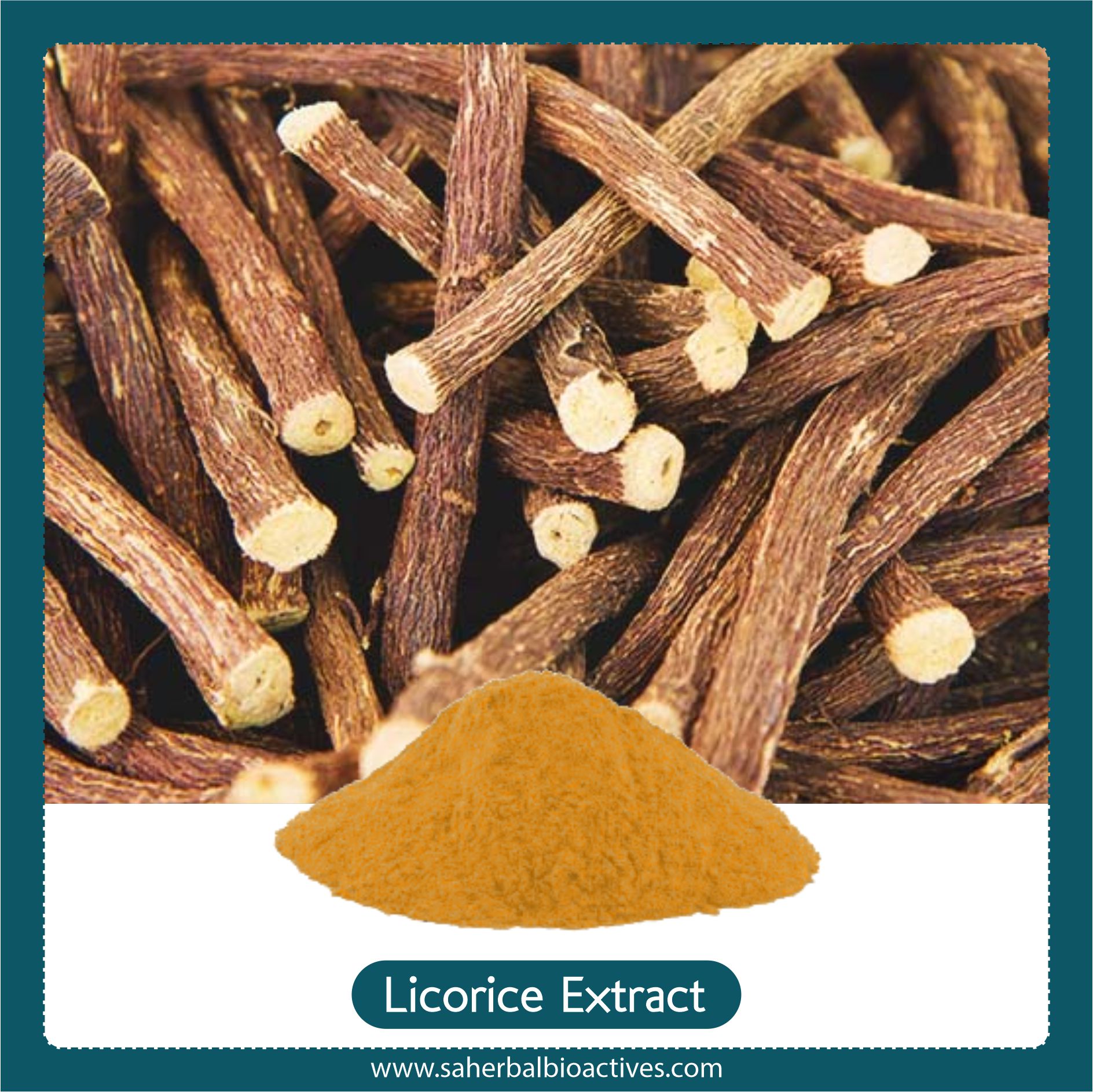Description :
Licorice extract, or licorice, is the root of Glycyrrhiza glabra herb from which a sweet flavor can be extracted (named Glycyrrhizin). The word Licorice is derived (via the Old French licoresse) from the Greek glycyrrhiza, meaning “sweet root”. Licorice flavors are used as candies or sweeteners, particularly in some European and Middle Eastern countries. Licorice extracts have a number of medical uses, and they are also used in herbal and folk medications. Hundreds of potentially healing substances have been identified in licorice as well, including compounds called flavonoids and various plant estrogens (phytoestrogens). The herb’s key therapeutic compound, glycyrrhizin (which is 50 times sweeter than sugar) exerts numerous beneficial effects on the body, making licorice a valuable herb for treating a host of ailments. It seems to prevent the breakdown of adrenal hormones such as cortisol (the body’s primary stress-fighting adrenal hormone), making these hormones more available to the body.
It has a well-documented reputation for healing ulcers. It can lower stomach acid levels, relieve heartburn, hyper-acidity, indigestion and act as a mild laxative.It also has a beneficial action on irritation, inflammation, and spasm in the digestive tract. Through its beneficial action on the liver, it increases bile flow and lowers cholesterol levels.
Licorice also appears to enhance immunity by boosting levels of interferon, a key immune system chemical that fights off attacking viruses. It also contains powerful antioxidants as well as certain phytoestrogens that can perform some of the functions of the body’s natural estrogens; very helpful during the menopause. Study on Glycyrrhizinic acid shows to stop the growth of many bacteria and of viruses such as influenza A.
It has anti-allergic, pain soothing action with fever-reducing properties. It supports anti-tissue action, eases congestion and coughing by helping to loosen & thin mucus in airways, which makes a cough more productive. Licorice supports cortisol enhancing activity, which helps to increase energy, ease stress and reduce symptoms of ailments – like chronic fatigue, muscular pain etc.
Licorice protects the Liver & promotes healing of the damaged cells. It shows anti- inflammatory action with antiviral & anti –oxidants properties that help maintain the overall health of the liver.
The phytoestrogens in Licorice have a mild estrogenic effect, which helps in easing certain symptoms of PMS (premenstrual syndrome) – such as irritability, bloating and breast tenderness. Recent studies have found that by limiting the damage from LDL (bad cholesterol), Licorice may reduce or prevent artery clogging plaque formation & contribute to healthy functioning of the heart.
Applications of Liquorice Root Extract:
1. Pharmaceutical and Herbal Medicine
Liquorice root extract is widely used in the pharmaceutical and herbal medicine industries due to its potent therapeutic properties. It is commonly included in formulations aimed at treating digestive disorders such as gastritis, ulcers, and acid reflux. Its anti-inflammatory and antiviral properties make it a valuable component in remedies for respiratory ailments, including coughs, bronchitis, and sore throats. Additionally, liquorice root extract is used in formulations for treating conditions like adrenal insufficiency, as it can help stimulate the adrenal glands.
2. Cosmetics and Skincare
In the cosmetics and skincare industry, liquorice root extract is prized for its skin-soothing and anti-inflammatory effects. It is a common ingredient in products designed to treat hyperpigmentation, as it can inhibit the production of melanin and lighten dark spots. Its anti-inflammatory properties make it beneficial in creams and ointments for conditions like eczema, rosacea, and psoriasis. Moreover, liquorice root extract is used in sunscreens and anti-aging products due to its ability to protect the skin from UV damage and reduce the appearance of fine lines and wrinkles.
3. Food and Beverage
Liquorice root extract is widely used as a natural sweetener and flavoring agent in the food and beverage industry. Its naturally sweet taste, derived from glycyrrhizin, is often used to enhance the flavor of candies, chewing gums, and beverages like herbal teas. Additionally, it is used in the production of traditional liquorice confectionery. Beyond its sweetness, liquorice root extract is also valued for its ability to mask bitter flavors, making it useful in various food formulations.
4. Traditional and Alternative Medicine
In traditional and alternative medicine, liquorice root extract is used for its adaptogenic properties, helping the body manage stress and restore balance. It is a staple in Ayurveda and Traditional Chinese Medicine, where it is used to treat a variety of conditions, from digestive issues to respiratory problems. It is also used as a harmonizing herb in herbal formulations, enhancing the effectiveness of other ingredients while reducing potential side effects.
5. Oral Care
Liquorice root extract is increasingly being incorporated into oral care products due to its antibacterial and anti-inflammatory properties. It is used in toothpaste and mouthwashes to help prevent cavities, reduce gum inflammation, and combat bad breath. Additionally, it has been studied for its potential in reducing dental plaque and treating oral infections.
6. Nutritional Supplements
The extract is also available in the form of nutritional supplements, often marketed for its digestive, respiratory, and immune support benefits. These supplements are used to help with conditions like indigestion, respiratory infections, and adrenal fatigue. Additionally, it is sometimes included in formulations designed to support liver health and detoxification processes.


